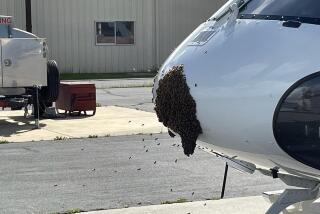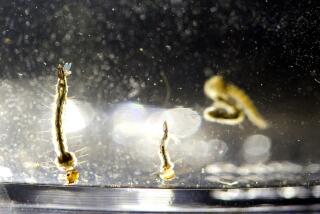Sex wars: Ant queens take sperm from males of other species
All’s fair in love and war – particularly when love is war. Scientists studying the habits of two related species of harvester ants have discovered that during sex, the queens will essentially steal sperm from unwitting male ants of the other species.
The findings, published in the Proceedings of the Royal Society B, shed light on the evolutionary arms race between two species that can play out in a battle of the sexes.
Researchers from the University of Vermont studied two species of Pogonomyrmex harvester ants that live in the desert around the border between Arizona and New Mexico. These two ant species can mate with each other, but these liasons only produce sterile hybrid ants. That’s a good thing for the queens, who need to produce these sterile workers to build their colonies. (She’ll also mate with males of her own species at some point during the mating melee to produce some fertile offspring.)
But for the male ants, this is an evolutionary dead end – since the hybrid offspring can’t reproduce, it means their genes won’t be passed on to future generations. If he wants grandkids, a male has to avoid those inter-species hook-ups and find a queen of his own species to mate with.
“This leads to a conflict of interests, as queens must mate with both lineages to produce both daughter queens and the workforce to care for them, but males gain fitness returns only by mating with queens of their own lineage,” the study authors wrote.
So under these rules, how does the mating game play out? The scientists went to a spot near Portal, Ariz., to see how the sexes navigated these evolutionary conflicts of interest. During the brief and frenetic mating flights that occur during the summer after a heavy monsoon rainstorm, the researchers nabbed incoming virgin males and females with an insect net. They hooked random females up with random males, watched what happened and then put the couples on ice for further analysis.
Here’s the problem for males in this crazy sexfest: In the scramble to outcompete all the other males going for the limited number of queens, it appears to be difficult for a lovesick male to tell which queen is his own species and which is the closely related but separate species. That’s a prime opportunity for queens looking to make some hybrid babies.
As the queen mates with an unsuspecting male, he starts to realize he’s chosen poorly. But there’s no escaping: Their sex organs are joined for the duration of copulation, so even if he lets go, they’re still locked in lovemaking.
Instead, the male tries to slow down the rate at which he’s giving sperm to the queen – maybe he can save some of his precious seed for the next tryst, hopefully with a more suitable queen of his own species.
But the queens have evolved a way to handle this slowdown – they simply hang on to their male partner for longer, until they receive the amount of sperm that they appear to feel is their due.
It seems that as the male ants have developed strategies to save their sperm for the right mate, the queens have developed strategies of their own to make sure this doesn’t happen. In chess as in antdom, it’s hard to beat a queen.
But why does evolution favor the females in this case? If it’s a sex-based evolutionary arms race, then why don’t the males eventually develop a strategy to identify a suitable queen before they start to mate?
It seems that if the males could have their pick, the colonies would end in mutually assured destruction. That’s because queens from both species need some sperm from the other species in order to create their sterile workers. Without that workforce, the colony falls apart.
“If males were fully successful in discriminating and selectively transferring sperm to their own lineage,” the study authors wrote, “queens would be unable to produce workers and populations would quickly collapse.”
So this antagonistic mating game, where the males and females work at cross purposes, must continue in order for the colonies to survive, the scientists explained, “despite the intrinsic disadvantages such complex mating systems entail.”
Think ants are amazing? Follow @aminawrite for more dispatches from the animal kingdom.







